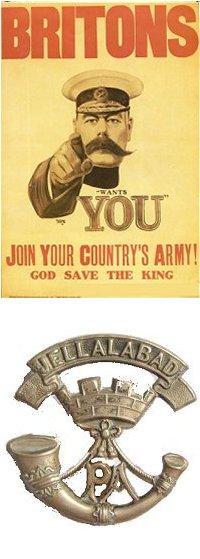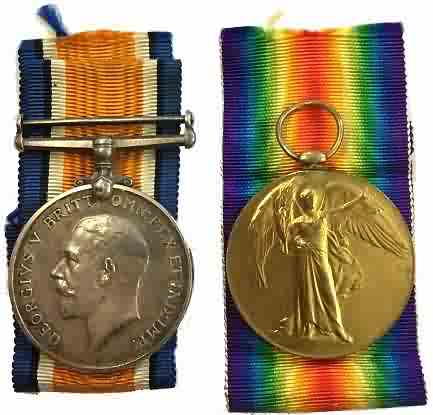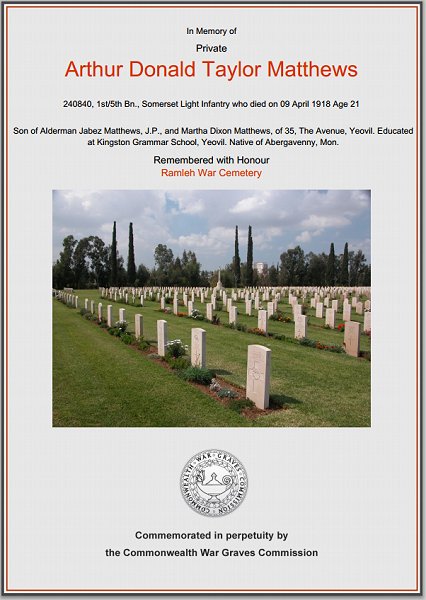yeovil at War
arthur donald taylor matthews
Died while in the Egyptian Expeditionary Force
Arthur Donald Taylor Matthews, known as Donald, was born in Abergavenny, Monmouthshire in 1896. He was the son of insurance superintendent, later Mayor of Yeovil, Jabez Matthews and Martha Dixon née Taylor. By the time of the 1901 census Jabez and Martha had moved to Yeovil and were living at 190 Sherborne Road with their children: Winifred (b 1885), Percy T (b 1886), Harold E (b 1887), Gladys (b 1893), Wilfred (b 1895), Donald (b 1897) and a female servant. Jabez gave his occupation as 'Superintendent of Insurance Agents, Prudential Assurance Co'. By the time of the 1911 census the family had moved to 36 The Avenue and 14-year old Donald was listed as a scholar and was attending the Kingston Grammar School. On leaving school he became and articled clerk in the solicitor's firm of Athelstan Rendall, MP, of Princes Street.
 Donald
enlisted in the
Army at Yeovil
when war broke
out and became a
Private (Serial
No 240840) in
the 1st/5th
Battalion of the
Somerset Light
Infantry. He
enlisted with
John Pound
(Service No
240833),
Ernest Luffman,
(Service No
240834) and
Earle Mitchell
(Service No
240835) - all
four served
together in the
same unit.
Donald
enlisted in the
Army at Yeovil
when war broke
out and became a
Private (Serial
No 240840) in
the 1st/5th
Battalion of the
Somerset Light
Infantry. He
enlisted with
John Pound
(Service No
240833),
Ernest Luffman,
(Service No
240834) and
Earle Mitchell
(Service No
240835) - all
four served
together in the
same unit.
The 1st/5th Battalion was a Territorial Battalion formed on 4 August 1914 at the County Territorial Hall, Taunton as part of the South-Western Brigade, Wessex Division. It was initially stationed at Plymouth for a few days and then proceeded to Salisbury Plain.
On 9 October 1914 the Battalion, including Donald Matthews, sailed from Southampton and arrived at Bombay, India, on 9 November 1914. The battalion remained at Jubbulpore until December, when it proceeded to Ambala. Strenuous training began almost immediately and continued almost for the next year.
In May 1916 a large draft of nine officers and 449 other ranks arrived from England. The battalion was temporarily divided during the ensuing hot weather with some companies going to Chakrata and the remainder to Meerut. The following months were mainly occupied in training the draft but even in the hills little was done beyond this owing to the exceptionally wet season.
The Battalion was reunited in October at Meerut. On 26 April 1917 17 officers and 838 other ranks of the Battalion sailed on HMT Chakdara from Bombay, landing at Suez, Egypt, on 11 May 1917, becoming part of 233rd Brigade, 75th Division - part of the Egyptian Expeditionary Force in Palestine.
Having spent an uneventful two and a half years in India it was now intended that the 1st/5th Battalion was to become involved in the attack on Gaza which had been ordered to take place on the morning of 2 November 1917 although 1st/5th Battalion of the Somerset Light Infantry were ultimately not employed in the attack.
The Regimental History of the Somerset Light Infantry records "Several weeks training at El Arish and Rafa, where long route marches through the burning desert fitted the battalion for the part it was to play in the near future, followed on 28 August Nos 1 and 2 Companies of the Battalion went into the trenches in the Sheikh Abbas area, south of Gaza, and were attached to the Argyll & Sutherland Highlanders for preliminary instruction in trench warfare.
On 12 September 1917 the Battalion took over the Apex right sub-sector of the Sheikh Abbas sector, three Companies in the front line and one in reserve. The front line taken over was approximately 2,000 yards in length. The remainder of September was uneventful, but the final entry in the Battalion Diary is of interest :-
"The health of the Battalion was not quite so good as previous month. Septic sores were very prevalent and 16 cases of dysentery occurred. The enemy's lines opposite Apex Right are nowhere near rather than 2,000 yards to our front-line trenches and the most important work done is by the night patrols. A considerable amount of work has been done on the trenches, 18 new dugouts have been constructed and additional trenches are being dug in our right subsector."
Following the attack on Gaza, the 1st/5th Battalion were next engaged in the Battle of Nebi Samwil, part of the Jerusalem Operations, from 17 to 24 November 1917. General Allenby had decided to attack the Turkish Seventh Army and occupied Jerusalem. This necessitated an advance through the difficult country of Judaea and Allenby's plan of attack was to move through the Judaean hills and break out onto the main Jerusalem-Nablus road, cutting off the Turks in Jerusalem. On 14 November the three brigades of the 75th Division were deployed, with the 1st/5th Somersets occupying the ridges west of El Kesman. They moved on 16 November to take up a line on a range of low, stony hills to the east of Junction Station and remained in this position throughout the 17th, when the operations began. The infantry advance began on 19 November with the 1st/5th Somersets concentrating on the Jerusalem Road, north of Junction station and then proceeding forward. The attack on Enab was carried out by the 1st/5th Somersets in front. According to the Regimental History "There was heavy driving rain as the troops moved forward and mist covered the battlefield, but with great dash the attacking waves advanced and completely drove the Turks from their positions in front of Enab.
For two hours during the early morning of 21 November the village of Enab was shelled heavily by the Turks and, owing to the congested state of the village -packed with troops and animals - casualties were heavy. On 23 November 1917 the 1st/5th Somersets of the 233rd Brigade had again become involved in stiff fighting with the enemy who was posted in strong positions at Nebi Samwil. The Battalion, which had gone into action on the 22nd November about 450 strong, had suffered 221 casualties in the two day's fighting - 3 officers killed and 6 wounded, 51 other ranks killed or missing and 161 wounded. The 75th Division moved on 26th back to Junction Station, and it was time for, as one diary states: "many men having no soles to their boots: new boots had to be obtained before they could march."
On 10 December 1917 the Battalion, being part of 232nd Brigade became Corps Reserve and thus the 1st/5th saw nothing of the fighting for Jerusalem and were able to rest for a while.
On 7 April 1918 the 1st/5th Battalion, being part of 75th Division, and the Regimental History of the Somerset Light Infantry takes up the story "At 4:15am Nos 4 and 2 Companies, with a sub-section of the Machine-gun Company, were to advance to the northern slopes of Wadi Lehham. From 5:05am to 5:10am the artillery and machine gun barrage was to fall on Rafat, and No 4 Company was to rush the village when the guns lifted. For the second phase, No 1 Company was to advance forward to the Wadi Lehham and, on reaching the northern slopes,was to change direction half-right and capture the south-eastern peak of Arara; No 2 Company was to deploy when ordered, ready to advance on the north-western peak of Arara. No 3 Company was to be in reserve. Punctually at 5:05am on the 9th the barrage fell and as it lifted, five minutes later, No 4 Company of the 1st/5th Somersets rushed forward to the attack. The Battalion Narrative is brief, but apparently by 5:30am Rafat had been seized and was in progress of being consolidated when the enemy placed a heavy bombardment on the village and the Wadi south of it." Donald Matthews was killed in this action. He was aged just 21.
On 24 April 1918 the Western Gazette reported "Much sympathy is extended to Alderman J Matthews, JP and Mrs Matthews, The Avenue, in the great bereavement they have just suffered, official news being received that their younger son, Private Donald Matthews of the Somersets, was killed in action in Palestine on the 9th inst. Previous to the war, Private Matthews was articled to Mr Athelstan Rendall, MP, solicitor, Princes Street, and had a promising career in front of him. On the outbreak of hostilities he joined the Territorials and went to India with the Wessex Division in October 1914. After two years service in India he was transferred with his Regiment to Palestine, and had been through the whole of General Allenby’s successful campaign against the Turks. He paid the supreme sacrifice during the recent heavy fighting, in which West Country troops took such a prominent part, and at the time of his death he was within a week of his 22nd birthday. Of a singularly open and bright disposition, Private Matthews had a host of friends, and the news of his untimely end will be received with the deepest possible regret in the town. The severity of the blow to Mr and Mrs Matthews is intensified by the fact that they have already lost one son in the war - Private Percy Matthews, of the Sherwood Foresters, laying down his life for his country in France in 1915. Three other sons are on active service, one of whom is recovering from the effects of gas poisoning."
Arthur Donald Taylor Matthews was interred at Ramleh War Cemetery, Israel, Grave N.26. His name is also recorded on the War Memorial in the Borough.
Donald lost two brothers in the war - Thomas Percy, known as Percy, and Wilfred Vernon.
gallery

Courtesy of
Trevor
Hawksworth
These are the medals awarded to Percy - the British War Medal (left) and the Victory Medal.

The Commonwealth War Graves Commission certificate in memory of Donald Matthews.